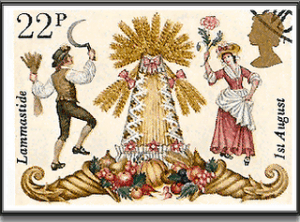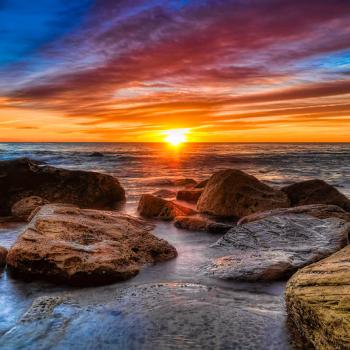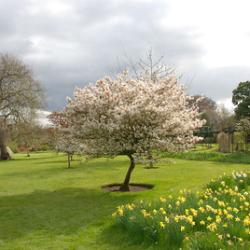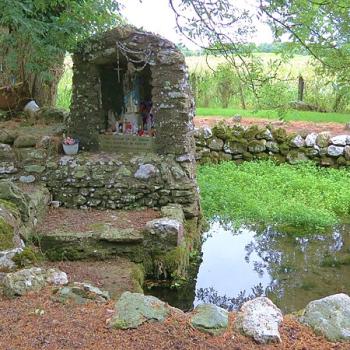 Summer is already showing a bit of its age. Although the Fourth of July holiday has only just passed, the signs of a ripening harvest are there. On a walk recently in park, I noticed pine cones, green at the bottom, and fully brown at the top. It has been wet and humid this summer, and the flowers have been lush. The farmers’ markets are filled with every vegetable you can imagine. On my city block, a gentleman who basically acts as a full-time gardener has once again monopolized much of the walking space with his container garden.
Summer is already showing a bit of its age. Although the Fourth of July holiday has only just passed, the signs of a ripening harvest are there. On a walk recently in park, I noticed pine cones, green at the bottom, and fully brown at the top. It has been wet and humid this summer, and the flowers have been lush. The farmers’ markets are filled with every vegetable you can imagine. On my city block, a gentleman who basically acts as a full-time gardener has once again monopolized much of the walking space with his container garden.
The practice of my faith is anticipatory- we are always celebrating one holiday with an eye towards what is coming next. Even though I do not grow my own food, the patterns of the moon and the sun and the workings of the soil determine what my life will be like, because I rely on moon, sun, and soil to sustain me. I can see that I have reached the milestone of Midsummer, but I am already packing for the journey towards Lughnassah or Lammas.
Three Themes of Lughnassah
The themes of this holiday in the Celtic-based tradition I learned were always community, harvest, and competition- with the last having more to do with displaying the skills one has learned that just competition for competition’s sake. At Lughnassah we find ways to uplift what we have learned and revel in how those skills and accomplishments can be shared by the community. This usually means a picnic of some kind and often games and competitions for children and adults alike- everything from Simon says to pie-baking. We also harvest for the first time- even a few snips of basil can be considered a harvest in this regard! These are some of the practical things one can do- possible in outdoor or even indoor sacred space- to honor the meaning of the holiday.
Even though modern earth-tradition practices are mostly based on what we do more than what we believe, I cannot help but ponder how these practices translate in terms of ethics, values, theology and lived experience. What does community mean to me? What does harvest? What skills am I willing to donate to the common good?
Community
Recently the importance of community came home to me in an unanticipated way. I participated in a vigil outside my Unitarian Universalist congregation in the wake of the massacre at Mother Emmanuel Church in Charleston, South Carolina. I was grateful that I had a community to pray and heal with. As we stood outside the church, which is located on Central Park West in Manhattan, passers-by joined us, or, if they couldn’t, they thanked us as they walked by. A taxi cab driver parked next to us and listened to us sing Amazing Grace. A couple out for a carriage-horse ride in the park instructed the driver to bring the horse to a stop and they also took a few candles and prayed with us. I don’t ever want to be reminded of community for that reason again, but I am grateful for the sacred space that was provided to us.
Harvest
Bountiful Harvest is the name of the garden at Central Unitarian Church in Paramus, NJ where I served as the Youth Coordinator this past year. I only worked for a sum total of about one and one half hours at the garden, but it is a beautiful thing, situated in one corner of the parking lot with a beautiful ornate sign and neat rows of corn and beans – produce that will eventually be harvested and donated to the Center for Food Action, a local food pantry and anti-hunger organization. The congregation has a special relationship to the Center for Food Action. Every year by making and selling lunches after Sunday worship, that congregation raises enough money to make hundreds of Weekend Snack Packs. These Snack Packs are boxes of food which go home with food insecure children. They help insure that on weekends, when children do not have access to their normal school lunch programs, they have a reliable source of supplemental nutrition. It is a highly successful, well-organized effort on the part of the congregation; one they can be proud of, one that engages every member of the community.
Competition
That brings me to the last theme of Lughnassah – competition, or displays of skill. Here is an opportunity to ask ourselves, well, what have we learned? How will I use it in service of community, and in order to gain a harvest for the greater good? The word competition may carry bad memories for some, but for the most part competition gives us the opportunity to compare ourselves to each other, to see how our skills combine with the skills of those around us, to learn from one another, and most importantly, to assess strengths and weaknesses. This, in turn, helps us discover treasures beyond price. No one person- not even the minister or priest or priestess- is good at everything a faith community needs. Some are better at organizing, some are better at constructing worship. Some are better listeners, and some are better at fundraising. It is skills like these, honed with patience and love, that make all the other efforts of your community- from social justice to religious education to ceremonies- well, magical. I can think of numerous ways to honor this aspect of Lughnassah, but they might only pertain to me and my community. Make your own list; you may be surprised by what you find.
Our common life, our connections to one another, our joys and our sorrows give us so many connections to harvest and so many opportunities, both expected and unexpected, to drawn strength from community. Every time the wheel turns we have more than just the customs of the seasons to get excited about, we have their intrinsic lessons and values to think of us well. Have a ripe, magickal summer- and be grateful!
















